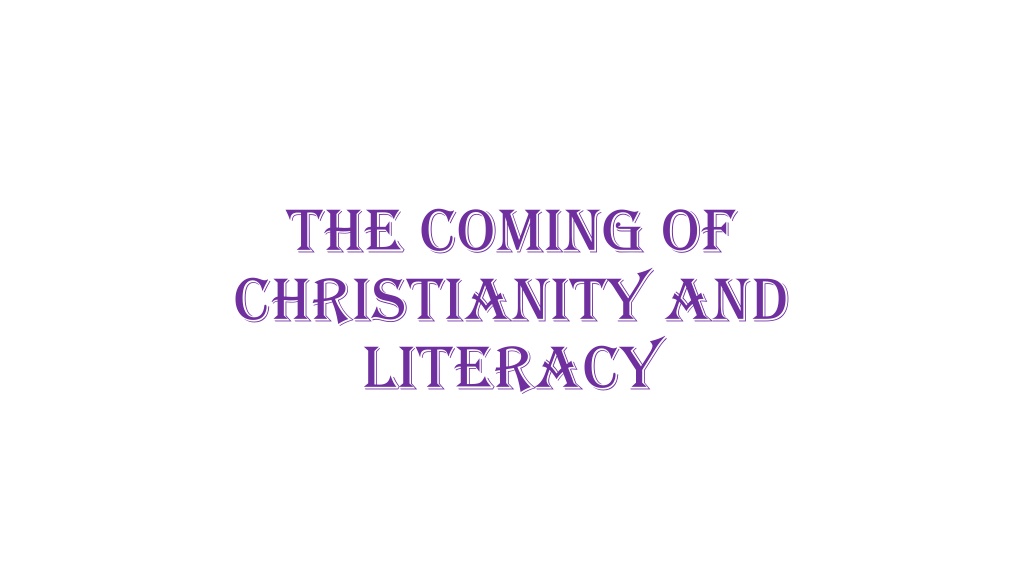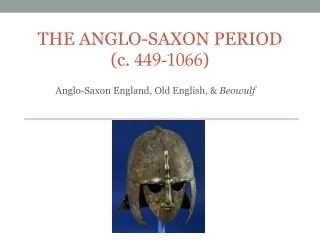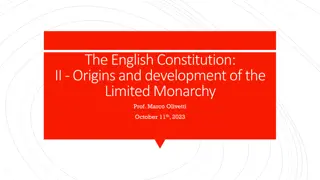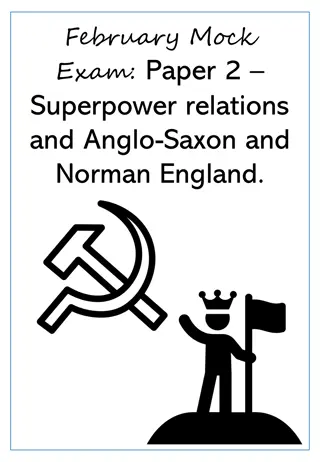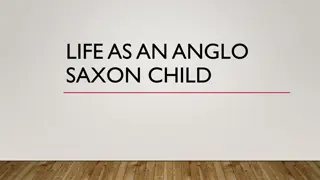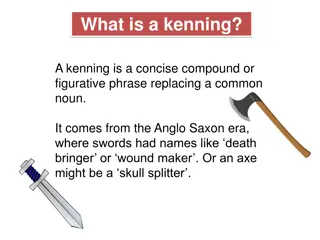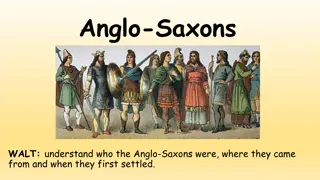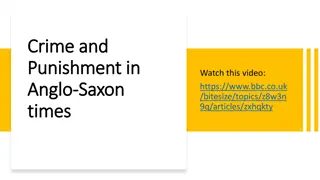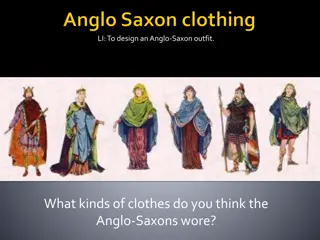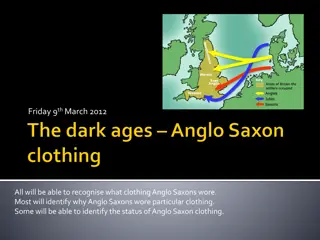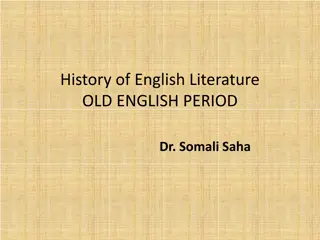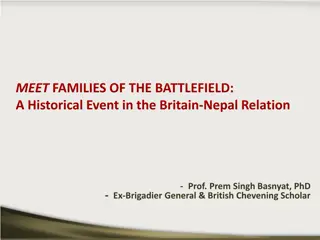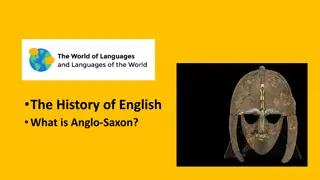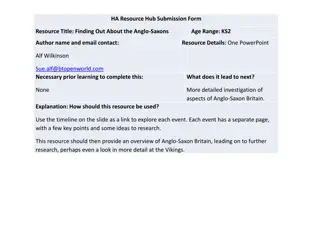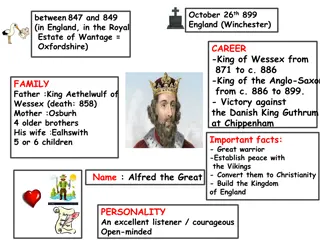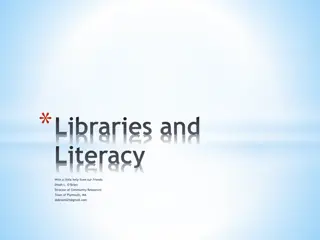The Impact of Christianity and Literacy on Anglo-Saxon England
The arrival of Christianity in Anglo-Saxon England by missionaries led by St. Augustine brought about significant cultural and linguistic changes, including the introduction of literacy and the Roman alphabet. This transformation facilitated the spread of European culture, influencing the adoption of new writing systems and the borrowing of Latin words into the English language. The early Christian missionaries played a crucial role in the development of literature and scholarship in England, heralding a period of literary flourishing in regions such as Northumbria.
Download Presentation

Please find below an Image/Link to download the presentation.
The content on the website is provided AS IS for your information and personal use only. It may not be sold, licensed, or shared on other websites without obtaining consent from the author. Download presentation by click this link. If you encounter any issues during the download, it is possible that the publisher has removed the file from their server.
E N D
Presentation Transcript
The Coming of Christianity and Literacy
Although many of the RomanoCelts in the north of England had already been Christianized, St. Augustine and his 40 missionaries from Rome brought Christianity to the pagan Anglo-Saxons of the rest of England in 597 AD. After the conversion of the influential King Ethelbert of Kent, it spread rapidly through the land, carrying literacy and European culture in it wake. Augustine was made Archbishop of Canterbury in 601 AD and several great monasteries and centres of learning were established particularly in Northumbria (e.g. Jarrow, Lindisfarne The Celts and the early AngloSaxons used an alphabet of runes, angular characters originally developed for scratching onto wood or stone. The first known written English sentence, which reads "This she-wolf is a reward to my kinsman", is an Anglo-Saxon runic inscription on a gold medallion found in Suffolk, and has been dated to about 450-480 AD. The early Christian missionaries introduced the more rounded Roman alphabet (much as we use today), which was easier to read and more suited for writing on vellum or parchment.
The Anglo-Saxons quite rapidly adopted the new Roman alphabet, but with the addition of letters such as ("wynn"), ( thorn ), ( edh or eth ) and ( yogh ) from the old runic alphabet for certain sounds not used in Latin later became "uu" and, still later, "w"; and were used more or less interchangeably to represent the sounds now spelled with th ; and was used for "y", "j" or "g" sounds. In addition, the diphthong ( ash ) was also used; "v" was usually written with an "f"; and the letters "q", "x" and "z" were rarely used at all. The Latin language the missionaries brought was still only used by the educated ruling classes and Church functionaries, and Latin was only a minor influence on the English language at this time, being largely restricted to the naming of Church dignitaries and ceremonies priest, vicar, altar, mass, church, bishop, pope, nun, angel, verse, baptism, monk, eucharist, candle, temple presbyter came into the language this way
However, other more domestic words such as fork, spade, chest, spider, school,tower, plant, rose, lily, circle, paper, sock, mat, cook, etc also came into English from Latin during this time, albeit substantially altered and adapted for the Anglo-Saxon ear and tongue. More ecclesiastical Latin loanwords continued to be introduced, even as late as the 11th Century, including chorus, cleric, creed, cross, demon, disciple, hymn, paradise, prior, sabbath, etc. Old English literature flowered remarkably quickly after Augustine s arrival. This was especially notable in the north- eastern kingdom of Northumbria, which provided England with its first great poet (Caedmon in the 7th Century), its first great historian (the Venerable Bede in the 7th-8th Century) and its first great scholar (Alcuin of York in the 8th Century),
Northumbrian culture and language dominated England in the 7th and 8th Centuries, until the coming of the Vikings, after which only Wessex, under Alfred the Great, remained as an independent kingdom. By the 10th Century, the West Saxon dialect had become the dominant, and effectively the official, language of Britain (sometimes referred to as the koin , or common dialect). The different dialects often had their own preferred spellings as well as distinctive vocabulary (e.g. the word evil was spelled efel in the south-east, and yfel elsewhere; land would be land in West Saxon and Kentish, but lond further north; etc).
The Anglo-Saxon or Old English Language
About 400 Anglo-Saxon texts survive from this era, including many beautiful poems, telling tales of wild battles and heroic journeys. The oldest surviving text of Old English literature is C dmon's Hymn (658 680) Anglo-Saxon Chronicle (the longest) Beowulf (the long epic poem) Beowulf may have been written any time between the 8th and the early 11th cc. by an unknown author or authors, or, most likely, it was written in the 8th c. and then revised in the 10th or 11th cc. It was probably originally written in Northumbria, although the single manuscript that has come down to us (which dates from around 1000) contains a bewildering mix of Northumbrian, West Saxon and Anglian dialects.
The 3,182 lines of the work shows that Old English was already a fully developed poetic language by this time, with a particular emphasis on alliteration and percussive effects. Even at this early stage (before the subsequent waves of lexical enrichment), the variety and depth of English vocabulary, as well as its predilection for synonyms and subtleties of meanings, is evident. For example, the poem uses 36 different words for hero, 20 for man, 12 for battle and 11 for ship. There are also many interesting "kennings" or allusive compound words, such as hronrad (literally, whale-road, meaning the sea), banhus (bone-house, meaning body) and beadoleoma (battle-light, meaning sword). Of the 903 compound nouns in Beowulf , 578 are used once only, and 518 of them are known only from this one poem.
Old English was a very complex language, at least in comparison with modern English. Nouns had three genders (male, female and neuter) and could be inflected for up to five cases. There were seven classes of strong verbs and three of weak verbs, and their endings changed for number, tense, mood and person. Adjectives could have up to eleven forms. Even definite articles had three genders and five case forms as a singular and four as a plural. Word order was much freer than today, the sense being carried by the inflections (and only later by the use of propositions). Although it looked quite different from modern English on paper, once the pronunciation and spelling rules are understood, many of its words become quite familiar to modern ears. Many of the most basic and common words in use in English today have their roots in OE, including words like
water, earth, house, food, drink, sleep, sing, night, strong, the, a, be, of, he, she, you, no, not, etc. Interestingly, many of our common swear words are also of Anglo-Saxon origin including tits, fart, shit, turd, arse and, probably, piss and most of the others were of early medieval provenance. Care should be taken, though, with what are sometimes called "false friends", words that appear to be similar in Old English and modern English, but whose meanings have changed, words such as wif (wife, which originally meant any woman, married or not), fugol (fowl, which meant any bird, not just a farmyard one), sona (soon, which meant immediately, not just in a while), won (wan, which meant dark, not pale) and f st (fast, which meant fixed or firm, not rapidly).
During the 6th Century, for reasons which are still unclear, the Anglo-Saxon consonant cluster "sk" changed to "sh", so that skield became shield. This change affected all "sk" words in the language at that time, whether recent borrowings from Latin (e.g. disk became dish) or ancient aboriginal borrowings (e.g. skip became ship). Any modern English words which make use of the "sk" cluster came into the language after the 6th Century (i.e. after the sound change had ceased to operate), mainly, as we will see below, from Scandinavia. First page of Beowulf Then, around the 7th Century, a vowel shift took place in Old English pronunciation (analogous to the Great Vowel Shift during the Early Modern period) in which vowels began to be pronouced more to the front of the mouth. The main sound affected was "i", hence its common description as "i-mutation" or "iumlaut" (umlaut is a German term meaning sound
alteration). As part of this process, the plurals of several nouns also started to be represented by changed vowel pronunciations rather than changes in inflection. These changes were sometimes, but not always, reflected in revised spellings, resulting in inconsistent modern words pairings such as foot/feet, goose/geese, man/men, mouse/mice, as well as blood/bleed, foul/filth,broad/breadth, long/length, old/elder, whole/hale/heal/health, etc. It is estimated that about 85% of the 30,000 or so Anglo-Saxon words gradually died out under the cultural onslaught of the Vikings and the Normans who would come after them, leaving a total of only around 4,500. This represents less than 1% of modern English vocabulary, but it includes some of the most fundamental and important words
e.g. man, wife, child, son, daughter, brother, friend, live, fight, make, use, love, like,look, drink, food, eat, sleep, sing, sun, moon, earth, ground, wood, field, house, home,people, family, horse, fish, farm, water, ti me, eyes, ears, mouth, nose, strong, work,come, go, be, find, see, look, laughter, night, day, sun, first, ma ny, one, two, other, some, what, when, which, where, word, etc ,
as well as the most important function words to, for, but, and, at, in, on, from, etc Because of this, up to a half of everyday modern English will typically be made up of Old English words, and, by some estimates, ALL of the hundred most commonly-used words in modern English are of Anglo-Saxon origin (although pronunciations and spellings may have changed significantly over time).
